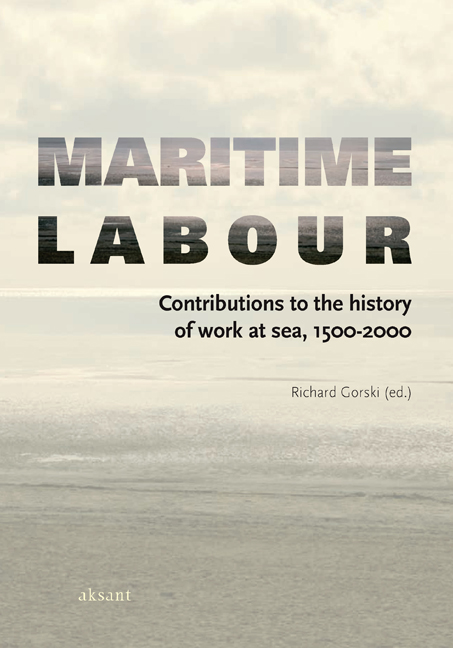Book contents
- Frontmatter
- Contents
- Introduction
- Six Cross-sections of the Dutch Maritime Labour Market: A Preliminary Reconstruction and its Implications (1610-1850)
- On Maritime Labour and Maritime Labour Markets in Germany, 1700-1900
- Swedish Naval Personnel in the Merchant Marine and in Foreign Naval Service in the Eighteenth Century
- Quantifying British Seafarers, 1789-1828
- ‘But for the Loves of the Fishes’: Maritime Labour and Ecological Culture in Nineteenth-century Newfoundland
- The Shipping Federation and the Free Labour Movement: A Comparative Study of Waterfront and Maritime Industrial Relations, c.1889-1891
- Health and Safety Aboard British Merchant Ships: The Case of First Aid Instruction, 1881-1908
- British Merchant Marine Engineer Licensing, 1865-1925
- Transatlantic Fishers: New England and British Trawlermen, 1960-1972
- Masters and chiefs: Enabling globalization, 1975-1995
- About the Contributors
Introduction
- Frontmatter
- Contents
- Introduction
- Six Cross-sections of the Dutch Maritime Labour Market: A Preliminary Reconstruction and its Implications (1610-1850)
- On Maritime Labour and Maritime Labour Markets in Germany, 1700-1900
- Swedish Naval Personnel in the Merchant Marine and in Foreign Naval Service in the Eighteenth Century
- Quantifying British Seafarers, 1789-1828
- ‘But for the Loves of the Fishes’: Maritime Labour and Ecological Culture in Nineteenth-century Newfoundland
- The Shipping Federation and the Free Labour Movement: A Comparative Study of Waterfront and Maritime Industrial Relations, c.1889-1891
- Health and Safety Aboard British Merchant Ships: The Case of First Aid Instruction, 1881-1908
- British Merchant Marine Engineer Licensing, 1865-1925
- Transatlantic Fishers: New England and British Trawlermen, 1960-1972
- Masters and chiefs: Enabling globalization, 1975-1995
- About the Contributors
Summary
This is a collection of soundings into various aspects of the history of maritime labour from the close of the Middle Ages to the present. The majority of the papers in this volume arose out of a workshop held at the Maritime Historical Studies Centre, University of Hull, in December 2005. The workshop was the first in a series of meetings in which to discuss and develop issues relating to the broad and cosmopolitan field of maritime labour history.
The spatial emphasis of the essays in this collection is north European and Atlantic since they deal with the countries around the North Sea and Baltic with some coverage of North America. A more accurate title for the volume also would have recognized the inclusion of not only seafaring (work at sea in the strict sense) but also a number of associated shore-based industries and the communities and societies that these forms of labour helped to sustain. The phrase ‘work at sea’ naturally makes one think of merchant seafaring and its ancillary trades but, again, several papers in this collection deal with navies and naval personnel as important constituents of the seagoing workforce. Indeed, from time to time the authors leave the sea behind in order to examine broader issues such as labour markets, the regulation and institutions of seafaring, and industrial relations on the waterfront. But at all points there is a common theme of sea-related labour, and a common objective of better understanding what have often been perceived as difficult and elusive groups of people. The cost of properly recognizing the scope of the collection would have been an unacceptably unwieldy subtitle.
The difficulty of deciding on an adequate title for the collection reflects the complexity of the subject and the diversity of scholarship devoted to it. It is unacceptable to speak of the history of seafaring (or of maritime labour, however broad or narrow the definition) for in reality there are multiple histories that intersect or diverge in accordance with the state of merchant shipping and other forms of maritime enterprise practised at different times and in different regions. There are common denominators of course; but the international or global aspects of shipping and seafaring were impinged upon and mediated by influences of a more or less localized character.
Information
- Type
- Chapter
- Information
- Maritime LabourContributions to the History of Work at Sea, 1500–2000, pp. 7 - 12Publisher: Amsterdam University PressPrint publication year: 2008
